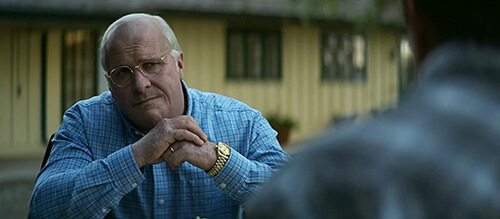A Millennial’s Take on Vice
Adam McKay’s Vice has sparked controversy amongst critics.
Kevin Fallon of The Daily Beast accuses it of “at best marginally [humanizing],” and “at worst [lionizing]” Dick Cheney. In her 1.5/4 star review, The Washington Post’s Ann Hornaday laments that “There aren’t any revelations or risky hypotheses proffered in Vice.” Vox reviewer Alissa Wilkinson points out that the post-credits scene (I left when the real credits started so I didn’t see it) shows McKay’s disdain for the American public, and that it is more of an indictment of them than Cheney. Wilkinson goes on to tell colleague Todd Van Der Werff that she believes “[they’re] both the target audience for this film,” each being “old enough to remember both Bush administrations clearly.”
Christian Bale as Dick Cheney in Vice.
I come from a different perspective than these authors because of my age. I was seven when George Bush took office. I don’t remember anything about the election controversy (‘How I Met Your Mother’ introduced me to the hanging chad), I vaguely remember 9/11 and the invasion of Iraq, and most of my exposure to Bush was through comedian impressions because his speeches were really boring. I sure as hell didn’t know who Dick Cheney was (but it was hilarious that his name was Dick). Most of my current views on the major events of the Bush presidency are retrospective, informed by years of investigation and research into the cause and consequences of those events.
Coming from the perspective of knowing virtually nothing about Dick Cheney, Vice works as a fascinating biopic with undertones that criticize the current state of US politics. I normally hate biopics because they’re too often feel-good stories of someone overcoming adversity shot and edited like every other film like it. Adam McKay has an absurd comedic style that I really enjoy, and chose a subject that he can get away with criticizing in the eyes of most Americans (Cheney was wildly unpopular in polls). While reviewers call Vice a tonal mess, I see it as a film that is aiming to entertain, and willing to take risks that other filmmakers aren’t (or can’t) with serious subject matters.
The primary metaphor in the film is fishing. The film will cross-cut between a political scene and fishing, and it’s all very fast-paced. When Dick Cheney is fishing, it isn’t for a need. He’s not providing for his family with the fish in any way. Why does he fish? The same reason he’s in office; he enjoys it. Cheney is in control when he’s fishing, and control and power are central to the character. He declines the initial invitation to be W.’s VP because the position is mostly symbolic and has no meaningful power. At one point the worms are compared to people whose lives Cheney cares nothing for. Fishing is also akin to focus groups Cheney used to market policy. The worms and lures are “messaging” to bring in the fish. There are also scenes where Cheney et al are seated at a restaurant where they are told the specials including the use of Guantanamo Bay and enhanced interrogation (torture) in order to win the War on Terror. More films need surreal sequences these days, and I liked seeing a more creative way to present these things than a bunch of people sitting around a room or just listing it via narration.
The film spends an hour establishing Cheney’s journey to 2001, including a significant amount of time spent in the Nixon and Ford administrations. I didn’t know that Cheney had been Ford’s Chief of Staff, and it uses Cheney (and briefly Roger Ailes) to show how conservativism got from where it was to where it is. In the 2001 portion, it shows that Cheney indirectly got John Bolton (Trump’s current National Security Advisor) a position in the Bush administration (he worked to exempt Americans from prosecution in the International Criminal Court during that time), Cheney used focus groups to affect Republican messaging to maximize support for questionable policies, and Cheney acted on dubious intelligence when the US invaded Iraq in 2003. Throughout all of this, I never saw a humanization of Dick Cheney. Maybe we feel empathy for him when it comes to his relationship with his daughters, but the end of the film shows that he’ll put politics over family. To say this is more of a criticism of the public than Cheney, one has to ignore the majority of the film where Cheney’s views on the value of human life is the most obvious criticism. This is exemplified in a sequence showing Cheney’s heart transplant, intercut with all the lives that have become worse since becoming involved with him.
Is Vice perfect? No. But Vice is a work that dares to bring its own style to the table. It tries to be accurate (the biggest factual criticisms I’ve found include the film’s implication that Cheney’s father-in-law killed his mother-in-law, and that in real life Cheney was super duper principled for real) and informative while being entertaining and using filmmaking techniques that are far from the norm. Maybe if we had more films like it, I’d be less forgiving of its changes in tone, but I’ll support attempts at uniqueness over standard biopic fare any day.
[DISPLAY_ULTIMATE_SOCIAL_ICONS]


